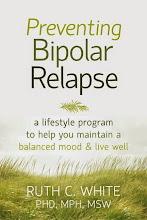Follow along with me on Twitter for information, strategies, science and random bipolar stuff:
bipolar101tweet
Wednesday, August 25, 2010
Tuesday, August 17, 2010
What Works...
I have not updated this blog for more than a year because I wanted to take some time off from thinking about bipolar disorder after completing my book, Bipolar 101. Sometimes talking about bipolar disorder gets to be tedious and tiring but I know that the point of this blog is to take the 'relevant' science of bipolar disorder and make it accessible to a broad readership. I am thus back and ready to keep you current on information from science that you can use in your own life. Or at least, find it interesting.
This first entry of 2010 starts with a nice summary of what works in managing bipolar disorder. I have found all these strategies quite useful for myself and all of these are given full treatment in my book, Bipolar 101. Nice to know that taking these individual strategies which have been found useful are also useful in the aggregate.
Please read. Comment. And if you've read my book, please place a review online at Amazon.com or BN.com. Thank you.
A study of 32 high-functioning individuals diagnosed with bipolar disorder I and II found that the following self-management strategies were most effective in managing symptoms:
1. management of sleep, rest, exercise and diet;
2. ongoing monitoring;
3. enacting a plan;
4. reflective and meditative practices
5. understanding bipolar disorder and educating others;
6. connecting with others.
What works for people with bipolar disorder? Tips from the experts by Suto, M; Murray, G; Hale, S; Amari, E; & Michalak EE. (2010). Journal of Affective Disorders, Vol 124(1-2), pp. 76-84.
A review of the new diagnosis of Pediatric Bipolar Disorder suggests that the childhood characteristics of people who were diagnosed with classic Bipolar 1 symptoms are different than the characteristics of children now being diagnosed with Pediatric Bipolar Disorder. This suggests that perhaps many of the children now being given this diagnosis may grow out of their behaviors and may not meet the Bipolar diagnosis when they become adults.
Pediatric Bipolar Disorder: Part I-Is it related to classical bipolar disorder? by Littrell, J & Lyons, P (2010). Children and Youth Services Review, Vol 32(7), pp. 945-964.
ADHD in adults have different characteristics than ADHD in children and adolescents with less externalizing symptoms and more co-existing mental health disorders. People who simultaneously have ADHD and bipolar disorder have a more severe disease course, more severe mood disorder symptoms and lower scores on tests of functioning when compared to people who have only one of these disorders occurring at a time. ADHD symptoms are often diagnosed as part of bipolar disorder symptomatology and therefore people who have both disorders at the same time tend to be underdiagnosed and undertreated.
Adult ADHD and its comorbodities, with a focus on bipolar disorder by Klassen, LJ, Katzman, MA, & Chokka, P. (2010) Journal of Affective Disorders, Vol124(1-2), pp.1-8.
This first entry of 2010 starts with a nice summary of what works in managing bipolar disorder. I have found all these strategies quite useful for myself and all of these are given full treatment in my book, Bipolar 101. Nice to know that taking these individual strategies which have been found useful are also useful in the aggregate.
Please read. Comment. And if you've read my book, please place a review online at Amazon.com or BN.com. Thank you.
A study of 32 high-functioning individuals diagnosed with bipolar disorder I and II found that the following self-management strategies were most effective in managing symptoms:
1. management of sleep, rest, exercise and diet;
2. ongoing monitoring;
3. enacting a plan;
4. reflective and meditative practices
5. understanding bipolar disorder and educating others;
6. connecting with others.
What works for people with bipolar disorder? Tips from the experts by Suto, M; Murray, G; Hale, S; Amari, E; & Michalak EE. (2010). Journal of Affective Disorders, Vol 124(1-2), pp. 76-84.
A review of the new diagnosis of Pediatric Bipolar Disorder suggests that the childhood characteristics of people who were diagnosed with classic Bipolar 1 symptoms are different than the characteristics of children now being diagnosed with Pediatric Bipolar Disorder. This suggests that perhaps many of the children now being given this diagnosis may grow out of their behaviors and may not meet the Bipolar diagnosis when they become adults.
Pediatric Bipolar Disorder: Part I-Is it related to classical bipolar disorder? by Littrell, J & Lyons, P (2010). Children and Youth Services Review, Vol 32(7), pp. 945-964.
ADHD in adults have different characteristics than ADHD in children and adolescents with less externalizing symptoms and more co-existing mental health disorders. People who simultaneously have ADHD and bipolar disorder have a more severe disease course, more severe mood disorder symptoms and lower scores on tests of functioning when compared to people who have only one of these disorders occurring at a time. ADHD symptoms are often diagnosed as part of bipolar disorder symptomatology and therefore people who have both disorders at the same time tend to be underdiagnosed and undertreated.
Adult ADHD and its comorbodities, with a focus on bipolar disorder by Klassen, LJ, Katzman, MA, & Chokka, P. (2010) Journal of Affective Disorders, Vol124(1-2), pp.1-8.
Subscribe to:
Comments (Atom)




